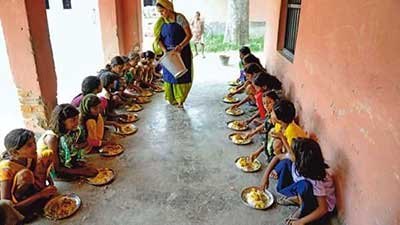Relevance: GS-2: Issues relating to the development and management of Social Sector/Services relating to Health, Education, Human Resources.
Key phrases: Poshan Abhiyan, NFHS 5, Malnutrition, Overweight, child mortality, undernourishment, 1000days
Why in News?
- The National Family Health Survey (NFHS-5), released in November,
indicates slow improvement in India’s malnutrition situation. The
problem remains persistent, pervasive and grave, with every third child
under five and a fifth of women undernourished, and overweight women
increasing to a quarter. More than every second child, adolescent and
woman is anaemic.
Only one in 10 children above 6 months receives an adequate diet in line with the recommended frequency of semi-solids fed 3-4 times a day at 6-8 months made of items from at least four food groups.
What is POSHAN Abhiyaan?
- POSHAN(Prime Minister’s Overarching Scheme for Holistic Nutrition) Abhiyaan is the flagship program to improve nutritional outcomes for children, pregnant women, and lactating mothers in India. It is also called the National Nutrition Mission.
- The objective of POSHAN Abhiyaan is to reduce stunting across districts with the highest malnutrition burden by improving utilization of key anganwadi services and improving the quality of anganwadi services delivery.
- In addition, the POSHAN Abhiyaan explicitly recognizes the need for convergence and coordination such that the benefits of multiple government schemes and programs reach women and children in the first 1000 days of a child’s life.
NFHS-5
- The NFHS is a large-scale, multi-round survey conducted in a representative sample of households throughout India.
- NFHS 5 talks about the key findings of the latest National Family Health Survey (NFHS-5) and causes behind lack of improvement in various key sectors.
- Key findings:
So, where are we failing in NFHS- 5?
- Negative trends are accompanied by other doable and essential nutrition interventions during the first 1,000 days of life (270 days of pregnancy and 730 days 0-24 months).
- NHFS states we have no maternal nutrition policy, but there has been an Infant and Young Child Feeding (IYCF) policy since 2000. The promotion of IYCF practices, like ensuring exclusive breastfeeding and ‘effective’ nursing for the first six months, followed by the introduction of appropriate semi-solids to complement breastfeeding, remains weak.
- NFHS-5 data suggests complementary feeding of semi-solids also needs attention. Only one in 10 children above 6 months receives an adequate diet in line with the recommended frequency of semi-solids fed 3-4 times a day at 6-8 months made of items from at least four food groups.
- The main reason for our poor showing is an information deficit. We cannot ignore that 20% of undernourished children are from communities with the highest wealth index.
- Additionally, families with overweight mothers often have undernourished children. Caregivers are not well informed about what, when and how often to feed a child over six months, and that breastfeeding must also be continued.
- Poor IYCF practices also contribute to obesity, micronutrient deficiencies and increased chances of adult-onset non communicable diseases.
- Often, parents unaware of the damage done by inappropriate feeding, take pride in spending ₹25-30 daily on feeding packaged snacks to their babies, instead of family-cooked pulses, curd, vegetables, ghee, eggs. The belief that 6–8-month-olds can’t swallow semi-solids often results in watery pulses being fed instead of khichdi.
- NFHS-5 findings confirm that we have failed to make the behavioural changes needed to improve nutrition care during the critical first 1,000 days of life—a basic strategy of the National Nutrition Mission.
What interventions are needed to tackle these issues?
- Frequent interpersonal counselling by health workers/medical teams at the right time is imperative. The Integrated Child Development Services (ICDS) scheme is our lead programme for this, but is not adequately reaching caregivers/mothers.
- In contrast, the public health system that is in charge of ANC, child delivery, PNC, home-based new-born and young child care and immunization services has the advantage of a minimum of 15 contact occasions with mothers, from the start of pregnancy until the child is 16 months old, and can influence nutrition practices.
- Nutrition care is divided into prevention and care between our health system and ICDS. Between the two, problems of prevention being resolved at the community level is a convenient assumption, but in actual practice, it’s highly impractical and time-consuming. To make a real difference in nutrition care behaviour practices and service delivery, it is time for the government to explore an alternative nutrition delivery mechanism.
- Policymakers must examine whether the mandate to spearhead interventions should be given to the regular health system, rather than ICDS. Merging the human resources of ICDS with our primary healthcare system would strengthen maternal-child nutrition and healthcare workforce and team work. This could cost-effectively lower child mortality, as 68% of India’s under-5 mortality is associated with under nutrition.
- Current times require integrated and coordinated efforts from all health institutions, academia and other partners directly or indirectly associated with the health care services to make the basic as well as advanced health services accessible, affordable and acceptable to all.
Source: Live Mint
Mains Question:
Q. What is the POSHAN Abhiyaan? Discuss the significance of POSHAN Abhiyaan in addressing India’s malnutrition problem as reflected in NFHS-5?







